

Baseball at Harringay Stadium
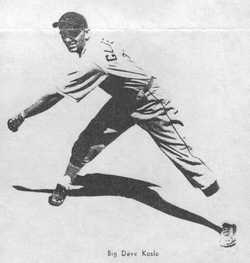 |
| Dave Koslo |
Following the game, an all-star team was selected to travel to Continental Europe and play a series of games against top military teams. Two days after the Stamford Bridge game, the U.K. Base All-Stars (as they were collectively named) faced the 13th Airborne Division Black Cats for a three-game series.
The 13th Airborne Division had arrived in France in February 1945. The division was never used in combat, and the Black Cats baseball team had plenty of game time under its belt and some excellent players to call upon. Two members of the Black Cats pitching staff had major league experience. Left-hander Dave Koslo had been with the New York Giants in 1941 and 1942, while Bill Kennedy, also a lefty, had pitched for the Washington Senators in 1942. Hank Behrman, a right-hander, would go on to pitch four seasons in the majors after the war. Another major leaguer, Merv Connors, had played first base with the Chicago White Sox in 1937 and 1938. Two other players, catcher Dick Bouknight and outfielder Frank Shank, had both played minor league baseball, while catchers Art Brickner and Danny Baich would both enjoy post-war minor league careers. Another player worthy of mention was hard-hitting leftfielder Phil Stropich, who played semi-pro baseball around Youngstown, Ohio before the war.
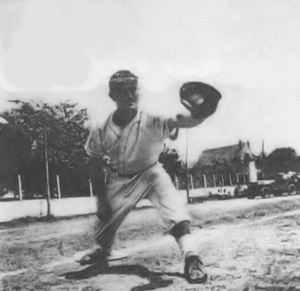 |
| Merv Connors |
July 8, 1945 was a warm and sunny day in London. The month had got off to a rather cool start but by the 8th the skies were clear and the temperature was in the low-70s; ideal for baseball. Enjoying the sunshine was a crowd of around 5,000 servicemen and local civilians who had gathered at Harringay Stadium in north London, a well-known greyhound racing and speedway venue that had a large grass area in the middle. They had come to see a ball game which, for the local civilians was probably something new although Harringay Stadium had been the home of the Hackney Royals semi-pro team in the late 1930s and had been used occasionally by British amateur teams.
“A good portion of the trouble expected Sunday,” prophesied John Wentworth in the Stars and Stripes on July 4, “is likely to come in the huge frame of Dave Koslo, big left-hander who was up with the New York Giants when the draft came along.”
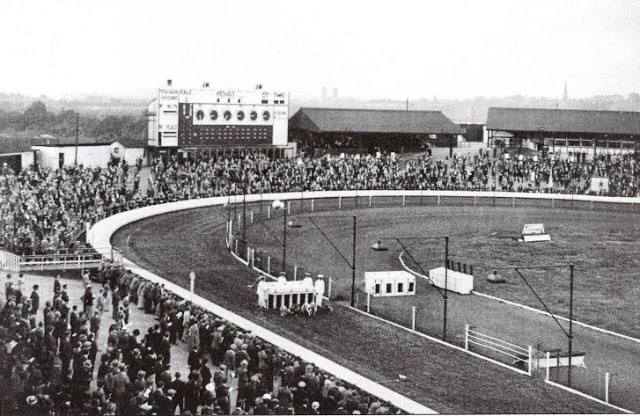 |
| Harringay Stadium in north London, England, where the
13th Airborne Division Black Cats met the U.K. Base All-Stars on July 8, 1945 |
Opposing Koslo for the All-Stars would be 31-year-old Ralph Ifft, who was with the Butler Yankees of the Penn State League before entering military service during 1942. Ifft, a Special Services Officer whose responsibilities included the organization of baseball and softball leagues, boxing shows, running a swimming pool and overseeing golf tournaments, was 14-4 with a 2.01 ERA with the Beaver Falls Browns in 1940.
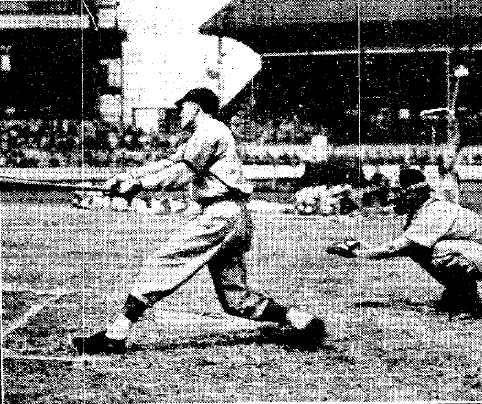 |
| Robert Dehner (who would go on to play for the Charlotte Hornets in 1946) takes a swing for the U.K. Base All-Stars against the 13th Airborne Division Black Cats at Harringay Stadium. The catcher is Dick Bouknight. |
The match-up of power pitcher Dave Koslo and crafty veteran
Ralph Ifft resulted in a scoreless pitching duel through seven
innings with neither team able to string enough hits together to
produce a run. But in the eighth inning, Dick Bouknight of the Black
Cats opened with a single and was moved to third on Merv Connors’
ground rule double. With first base open, Ifft chose to pitch to
rightfielder Danny Baich who obliged with a single, scoring two
runs. Two infield errors followed, and then Frank Shank punched
another ground rule double over the wire behind third base for two
more runs. With Kent Sterling - who was pitching for the Binghamton
Triplets in 1942 - on the mound in relief of Ifft, no further damage
was done, but the All-Stars were unable to score against Koslo in
the eighth or ninth, losing 4-0 and suffering their second shutout
at the hands of the big leaguer. This time Koslo had allowed just
five hits while striking out six.
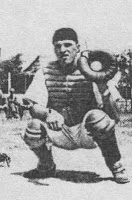
Danny Baich went
2-for-4 at the plate against the All-Stars. His
eighth-inning single scored two runs
The Black Cats continued to play in France during the summer of
1945, compiling an impressive record of 33 wins and four losses,
clinching the XVI Corps title in July before Allied Airborne Army
Headquarters announced that the division would be redeployed to the
Pacific to participate in the invasion of Japan. The 13th Airborne
arrived back in the United States on August 23, 1945 and was
stationed at Fort Bragg, North Carolina. Shortly thereafter, Japan
surrendered.
Dave Koslo pitched in the major leagues until 1955. He led the National League with a 2.50 ERA in 1949. Danny Baich played in the minors for 15 years, retiring after the 1960 season. His best year was with the Globe-Miami Browns in 1948, when he batted .338 and hit 27 home runs. Dick Bouknight played in the minors until 1951. He led the Tri-State League with a .367 batting average while playing for the Asheville Tourists in 1946. Kent Sterling, the All-Stars relief pitcher, returned to the minors and was 13-18 with the Beaumont Exporters in 1948. As for Ralph Ifft, he returned to the minor leagues in 1946, making just three appearances for the Youngstown Gremlins before calling it a day. He went on to become the director of recreation at Butler Veterans Hospital in Pennsylvania, and retired after 34 years service.
Added: September 12, 2013